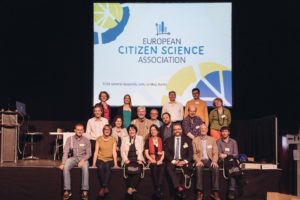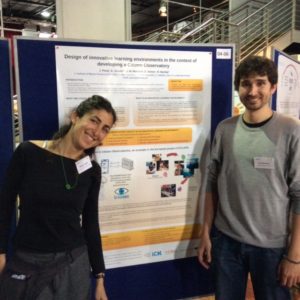We are always surprised by the events we attend; and the First International ECSA Citizen Science Conference, held on May 19–21, 2016 in Berlin, was a complete, surprising success. It gathered policy makers, scientists, non-governmental organizations and other interested citizens in a transdisciplinary environment in the field of citizen science, which is the work undertaken by civic educators together with citizen communities to advance science, foster a broad scientific mentality, and/or encourage democratic engagement. Citizen science is also a flexible and complex expression, and we recommend reading the 10 ECSA principles of citizen science if you want to know more. At the conference, it was explored how citizen science can contribute to the domain of open science, as well as to responsible research and innovation.
1000001 Labs has presented diverse, relevant contributions:
- a talk (Ceccaroni, L. et al. Citizen engagement); and
- two posters:
- Bardají, R. et al. Citizens’ Observatories in coastal environments: using innovative technologies (DIY instruments and data sonification) for engaging volunteers; and
- Piera, J. et al. Design of innovative learning environments in the context of developing a Citizen Observatory.
Furthermore, we have organised the panel “The diversity of citizen-science technologies: traditional and new opportunities for interactive participation in scientific research“, and we have participated actively in a consolidated Working Group, “Projects, data, tools, and technology” (chaired by Jaume Piera, from ICM-CSIC); in a recently formed Working Group, “Citizen science in schools”; and in the international “Data and metadata” working group (co-chaired by Anne Bowser, from Woodrow Wilson International Center for Scholars, and Greg Newman, from Citsci.org). And it has been a very interesting opportunity to present the results of the project we coordinated during the last three years: Citclops, of which several researchers were present. Besides, the General ECSA Assembly took place during the conference and Luigi Ceccaroni, co-founder of 1000001 Labs, was re-elected on the Board of Directors.

The conference organizing committee and ECSA Board of Directors, with Luigi Ceccaroni in the bottom right corner
The outcome of the participation in the conference has been extremely rewarding. We have learnt a little bit more about the state-of-the-art in citizen science, with new perspectives of citizen observatories in the society. We have reconnected with colleagues and established new connections, and we have experienced an innovative way to do conferences. Indeed, this conference was an improved, 3.0 version of other conferences we have attended: more spaces and opportunities to collaborate, such as the ThinkCamp Challenge, round tables, panels of experts, connections with societal organisations, such as makerspaces, and fun opportunities, such as the citizen science disco and the citizen science safari. The ECSA 2016 Conference was also the opportunity to present the release of the first issue of the Journal “Citizen Science: Theory and Practice” and the book “Analyzing the Role of Citizen Science in Modern Research“, being edited by L. Ceccaroni and J. Piera.
More information about the event can be found at [http://www.ecsa2016.eu/].
ECSA 2016 Photo Gallery can be found at [http://ogarit.jalbum.net/ECSA 2016/].
